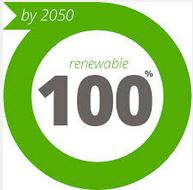Local economic opportunities of Renewable Energy2014-12-05 Dr. Susanna Godehart, Energy Office eThekwini Municipality
There is worldwide consensus that to limit climate change, most energy needs to be generated from renewable sources in the long-term. Several countries have set targets to achieve 80 to 100% of energy through renewable sources by 2050. In South Africa, a national target has been set to produce 42% (installed capacity) from renewable sources by 2030. Municipalities are critical actors in the quest to convert to renewable sources because globally 75% of energy is consumed by cities. The eThekwini Municipality faces severe energy related challenges.The local economy and the residential sector are very energy intensive and nearly all energy consumed in Durban is imported. The eThekwini Energy Office has calculated that in 2012, close to R50b was spent on energy. This is 15% of the local GDP, or one Rand in every seven Rands spent. The energy supply is very carbon intensive. In 2012 the greenhouse gas emissions in Durban were around 8t CO2 per resident. This figure matches the figure of developed countries with far higher GDP per resident. The electricity supply depends almost exclusively on ESKOM that increasingly struggles to ‘keep the lights on’. Only a tiny portion of electricityis locally produced from renewable sources. The challenges underline the need to reduce the energy intensity of the local economy and to reduce the dependency on energy import. But they also show the large economic opportunities if money that is currently spent on importing energy would be redirected to generate energy locally from renewable sources. This would result in a stronger and greener local economy. In addition, such a transition to renewable energy will impact positively on the environment and on the health of the residents. A future energy system will rely on renewable sources such as solar, wind and biomass to supply electricity, heating and cooling, and power the transport system. A large number of local, small and medium sized producers will contribute to the energy supply and will make it more sustainable. Incorporating these new suppliers requires changes to the energy infrastructure, especially the electricity grid. Worldwide, cities and regions are taking leading roles in climate change mitigation because of their responsibility for the energy related infrastructure. In order to allow for the transition to a sustainable energy supply, cities will have to adjust infrastructure networks and operations. The complexity and cost of the transition to a low-carbon and green economy require a long-term planning perspective. The Durban Climate Change Strategy sets ambitious targets for energy efficiency and renewable energy. In order to achieve the targets, the city must transition to a more sustainable energy supply. Currently, in South Africa only limited information exists on institutional, financial and technological requirements how to achieve this. The eThekwini Municipality is embarking on a research project into these requirements. It will also assess the local potential for energy efficiency, the type and quantity of renewable energy sources, and the future energy demand. The objective of the project is to develop a framework for the transition to a more sustainable and self-reliant energy supply for the eThekwini Municipality. The framework will inform municipal policy to create the conditions for the emergence of a local energy sector as part of the green economy. This sector will provide socioeconomic opportunities, such as the promotion of innovation, economic development and the creation of green jobs. www.durban.gov.za |
Local economic opportunities of Renewable Energy
Copyright © 2024 KwaZulu-Natal Top Business
